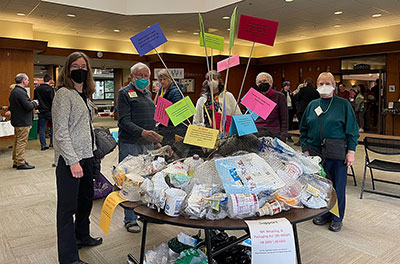| Search PNC News for stories of people and churches in our UCC Conference: |
|---|
Churches work together to pass climate legislation
A blob of plastic trash appeared in the narthex of Seattle’s University Congregational UCC on Sunday, Jan. 21.
 |
Plastic blob draws attention at coffee hour. |
UCUCC’s Sacred Earth Matters (SEM) group put it there two weeks after the start of the 2024 legislative session to build support for one of SEM’s legislative priorities.
“The blob did exactly that,” said Lon Dickinson of SEM.
People were asked before the 2024 session to urge their legislators to make recycling plastic a priority. There was a letter to the editor in the Seattle Times, too.
“The blob provoked discussion on plastic being a byproduct of oil and the failure of producers to reduce their greenhouse gas emissions and re-use plastic they produce,” he said.
People took handouts asking them to call and leave a message at the legislative hotline, 800-562-6000, and urge their legislators to support House Bill 2049, the Washington Recycling and Packaging Act.
HB 2049 would have made manufacturers responsible for the end-of-life management of plastic and other packaging via an Extended Producer Responsibility (EPR) program. They would have to 1) incrementally increase the quantity of plastic re-used in making new plastic and 2) financially support a producer organization to provide free, universal recycling services throughout Washington.
Although the bill failed, ongoing education is needed to keep people engaged, said Lon.
“It was the fifth year SEM worked to get EPR established This year’s bill had support from the Environmental Priorities Coalition,” Lon said, but it had strong opposition and didn’t get a floor vote.
“House leaders couldn’t afford the time needed to debate to defeat floor amendments,” Lon said.
“SEM typically champions bills that protect God’s creation or address global warming. That includes treaty rights of sovereign tribal nations, saving salmon, protecting vulnerable populations and mature forests. Its bills usually face up-hill battles and require strong advocacy efforts. Only four of its 12 priority bills were approved, and the margins of approval were both narrow and partisan.
Winning bills dealt with Zero Emission School Buses (HB 1368), Transitioning Puget Sound Energy Off Natural Gas (HB 1589), Linkage of WA Carbon Market with the California-Quebec Market (SB 6058), and Food Waste & Solid Waste Management (HB 2301).
The list of people who receive SEM’s legislative alerts includes more than 150 names of committed people. Each weekly email alert in the legislative session provides basic information on a bill and identifies if support is needed for a committee or floor vote. Because they are routinely shared with family, neighbors and co-workers, SEM has no idea how many people read the alerts.
“Feedback is invariably on how easy they make it for people to be advocates,” he said.
Short announcements in UCUCC’s weekly email blast urge other people to call the hotline to support that week’s bill.
SEM also has a contact person at three other churches and synagogues in Seattle and nine churches elsewhere in Washington. These people forward alerts to their congregants.
The legislators in at least 22 legislative districts are being urged to support a specific SEM priority bill each week. That’s 45 percent of Washington’s legislators, said Lon.
“Unfortunately, it’s not enough to achieve what is needed to save our environment for future generations,” he said. “Too many climate-related bills died this session. The work needs help from all PNCUCC churches. UCC churches statewide should collaboratively cajole and work with legislators to help sustain our planet.
“Bills supporting the production/use of green hydrogen, geothermal power and nuclear fusion have bipartisan support, but otherwise, there is an unfathomable gulf,” he said. “More legislators must be persuaded to support more bills to slow global warming. That includes protecting our carbon-storing forests and agricultural lands and capturing methane cattle emit. Surely, we can find ways to generate and transmit zero emission energy.”
SEM is ready to work with people at more churches.
“Lobbyists say six to 10 calls or messages can determine how a legislator votes. So, increasing the number of advocates in districts would help. Adding churches in more districts would be strategic in dealing with the environmental catastrophe we’re confronting,” Lon said.
“Advocacy doesn’t end when the legislature adjourns,” he said.
In mid-2024, SEM will provide questions people can ask legislative candidates for the Aug. 6 primary and Nov. 5 elections. It can also modify its scorecard for how legislators voted on SEM’s 2024 priorities to include new legislators.
Lon believes legislators need to know when their constituents are “disappointed” by their committee or floor votes. “Why” might facilitate dialogue, and “thank you” is always appreciated.
SEM will also provide information on Initiative 2117, which will be on the November ballot. This initiative would nullify Washington’s 2021 Climate Commitment Act and the carbon-pricing auction revenues—more than $2 billion in 2023—which are currently funding conservation restoration projects and programs to reduce greenhouse gas emissions.
“It matters that we all speak up in loud voices on its behalf,” said Lon, who has done legislative advocacy seven years since moving to Seattle in 2013.
A political science major, he worked with Washington state legislators when he was director of the Timberland Regional Library Olympia from 1985 to 1992. He also did advocacy in Minnesota, Nebraska and Georgia. He librarian at the Jefferson Parish Library in New Orleans from 2004 to 2013.
For information, email lon_dickerson@yahoo.com or visit universityucc.org/connect/sem.
Pacific Northwest United Church of Christ Conference News © April 2024
